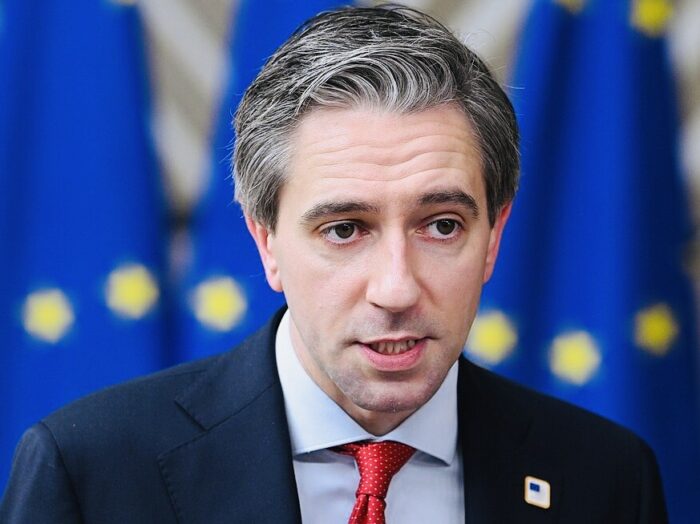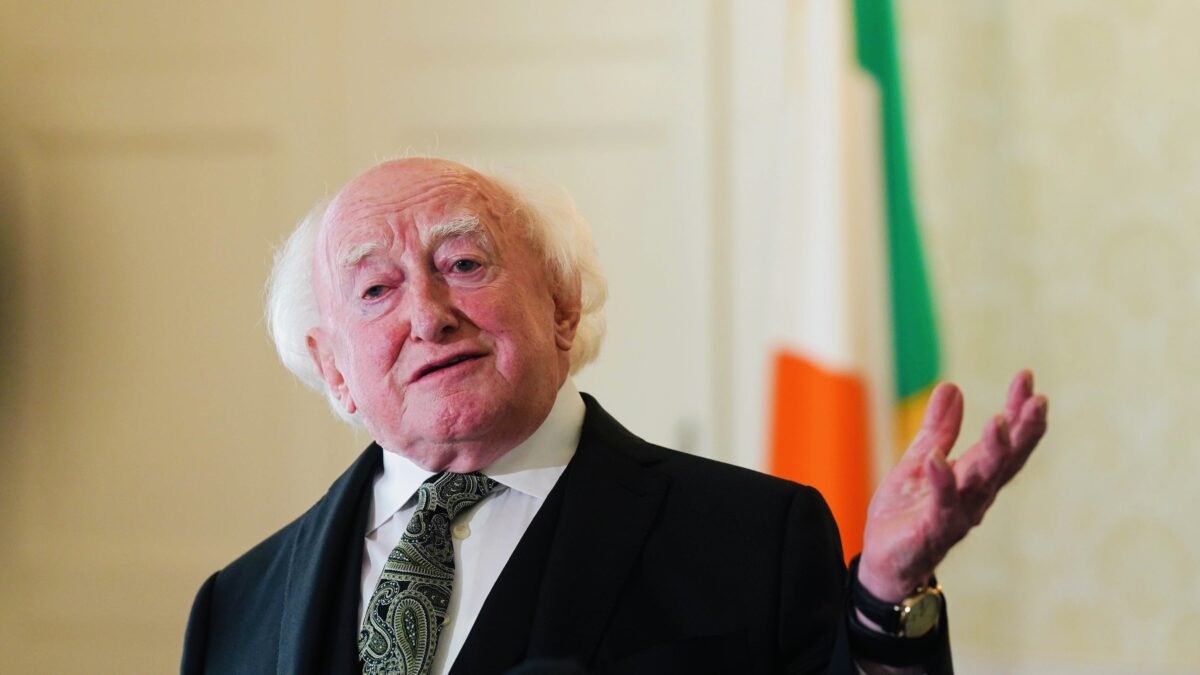Israel made a foolish mistake by closing its embassy in Ireland, a decision that Foreign Minister Gideon Sa’ar announced on December 15. It comes across as a gratuitous public relations stunt that can neither benefit Israel nor its bilateral relations with Ireland.
He resorted to this drastic and unnecessary step after Ireland joined South Africa’s case against Israel at the International Court of Justice in The Hague. South Africa has charged Israel with committing genocide during its military campaign in the Gaza Strip, an accusation that the Israeli government justly rejects.

Ireland’s embrace of South Africa’s position comes as no surprise. Last month, the Irish parliament passed a non-binding resolution declaring that “genocide is being perpetrated before our eyes by Israel in Gaza.”
And over the past few decades, Ireland has been critical of a wide range of Israeli policies, much to Israel’s chagrin.

Last May, Israel recalled its ambassador in Dublin, Dana Erlich, following Ireland’s recognition of Palestinian statehood. And in 2021, much to Israel’s annoyance, the Irish Parliament unanimously passed a motion condemning the “de facto annexation” of Palestinian land in the West Bank.
In justifying the closure of the embassy, Sa’ar said that Ireland has crossed “every red line” in its relations with Israel, and that Ireland’s policy is framed by a type of antisemitism based on the delegitimization and dehumanization of Israel. “This is how Ireland has allowed itself to behave towards Israel,” he claimed.
Ireland, on December 17, responded to Sa’ar’s allegation, with Irish President Michael Higgins denouncing his comments as slanderous.

Israel’s pique does not mean that it has severed diplomatic relations with Ireland altogether. As Irish Foreign Minister and Deputy Prime Minister Micheal Martin noted, Ireland’s embassy will continue to function under the authority of its ambassador in Tel Aviv, Sonya McGuinness.

“I believe firmly in the importance of maintaining diplomatic channels of communication and regret that this decision has been taken,” he said. “Inherent in that is the right to agree and disagree on fundamental points.”
Simon Harris, the prime minister of Ireland, weighed in as well, describing Israel’s move as “deeply regrettable.” Denying that Ireland is anti-Israel, he wrote, “Ireland is pro-peace, pro-human rights and pro-international law.”

Ireland may be a paragon of peace, but its decision to join South Africa’s flimsy case against Israel is disappointing and insulting.
Israel has not deliberately targeted Palestinian civilians in Gaza on the basis of their ethnicity or religion. In other words, Israel has not violated the United Nations’ genocide convention, upon which South Africa’s case rests.
Israel’s lengthy and still ongoing operation in Gaza has been aimed exclusively at heavily-armed Palestinian fighters from Hamas, which planned and orchestrated the October 7, 2023 massacre in southern Israel. This atrocity claimed the lives of about 1,200 people, led to the abduction of 251 Israelis and foreigners, and drove Israel to invade Gaza.
Israel had no alternative but to react ferociously to Hamas’ atrocity, the worst single act of violence against Jews since the Holocaust. In prosecuting its war of self-defence in Gaza, Israel did not commit genocide, even if South Africa and Ireland are fixated on promoting this erroneous narrative.
The objective of Israel’s invasion was three-fold: to destroy Hamas’ military and governing capabilities and to free the hostages.
Israel did not intend to kill Palestinian civilians per se. Nevertheless, tens of thousands have been killed, mostly due to the fact that Hamas’ command posts, firing positions, weapons manufacturing plants, arms storage facilities and tunnels were placed in civilian infrastructure.
In pointing a finger at Israel, Ireland ignored all these relevant factors and even had the gall to claim that its decision to align itself with South Africa should not be seen as “a hostile act” against Israel.
Martin, who is expected to become prime minister in January, explained Ireland’s stance as a strenuous objection to the “level of killing of innocent men, women and children in Gaza.” He added that Ireland’s policy is guided by “the principles of international law and the obligation on all states to adhere to international humanitarian law.”
Claiming that Israel has inflicted “collective punishment” on “the Palestinian people in Gaza,” he called for an immediate ceasefire, the release of all hostages and the flow of humanitarian aid into Gaza.
Ireland’s position is shared by most member states of the United Nations. And while the Israeli government has every right to disagree with Ireland’s perception of Israel’s conflict with the Palestinians, Sa’ar went too far by shuttering Israel’s embassy in Dublin.
Is he now prepared to close embassies in countries that criticize Israel’s policies or accuse Israel of genocide?
One can only hope that common sense will prevail and that Israel will not embark on this counter-productive path. Instead of closing embassies, Israel should set out the merits of its approach to the Palestinians. In this respect, Israel should take steps to accommodate itself to a two-state solution, which it currently rejects but which Ireland actively promotes.
Israel should be under no illusions about Ireland’s pro-Palestinian orientation. The Palestinian issue has loomed large in Ireland’s perception of the Arab-Israeli conflict.
Ireland’s former prime minister, Leo Varadkar, believes that Irish sympathy for the Palestinians is deeply rooted. “Leaders often ask me why the Irish have such empathy for the Palestinian people,” he said during a visit to Washington earlier this year. “The answer is simple: We see our history in their eyes. A story of displacement, of dispossession, national identity questioned or denied, forced emigration, discrimination, and now, hunger.”
A wide range of issues have affected Israel’s relationship with Ireland since the establishment of formal diplomatic relations in 1975.
Ireland condemned Israel’s air strike on Iraq’s Osirak nuclear reactor in 1981. Ireland, in 2003, opposed the construction of Israel’s security barrier through parts of the West Bank. Ireland, following Israel’s war with Hezbollah in 2006, apparently sought to limit the transfer of U.S. weapons to Israel through Shannon airport.
In 2010, an Israeli embassy official in Dublin was expelled after Ireland learned that the Mossad, the Israeli intelligence service, had fabricated fake Irish passports in connection with its assassination of a Hamas leader in Bahrain.
Ireland and Israel also have clashed over incidents related to Ireland’s participation in the United Nations peacekeeping force in Lebanon.
The nub of the problem is that Israel and Ireland are not on the same page on major regional issues, as former Irish cabinet minister and Jewish community member Alan Shatter said in 2013: “Ireland is a friend of Israel. We have a government in Ireland that wants a deeper engagement. But we also have a government in Ireland that is committed to the peace process.”

Since there has been no Israel-Palestinian peace process for at least a decade, and since Israel is governed by a right-wing coalition that utterly rejects Palestinian statehood, Israel’s relations with Ireland will continue to be tense and testy.
This will be particularly true because Ireland hews to the false and slanderous accusation that Israel has committed genocide in Gaza.
